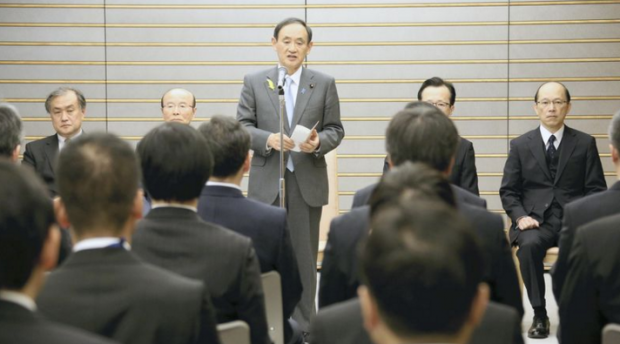Japan launches antiterrorism unit

Koichi Nakamura / The Yomiuri Shimbun
Chief Cabinet Secretary Yoshihide Suga delivers a speech during an inauguration ceremony for Counterterrorism Unit-Japan at the Prime Minister’s Office on Tuesday.
Japan launched its counterterrorism unit ahead of schedule on Tuesday to shore up the nation’s antiterrorism measures following multiple terrorist attacks in Paris.
Counterterrorism Unit-Japan (CTU-J), which was initially planned for an April launch, will be tasked with gathering intelligence on terrorists overseas. The CTU-J will reinforce the Prime Minister’s Office, which the government envisages will become Japan’s command center for antiterrorism efforts ahead of the Ise-Shima Summit meeting of the Group of Seven countries to be held in Mie Prefecture next May and the 2020 Tokyo Olympics.
Chief Cabinet Secretary Yoshihide Suga attended the CTU-J’s inauguration ceremony at the Prime Minister’s Office.
“Eclipsing the boundaries of ministries and agencies, I hope each of you will utilize all of Japan’s resources and do as much as possible to obtain information about international terrorists,” Suga said.
The CTU-J will be staffed by about 20 officials from various government entities including the Foreign Ministry, the Defense Ministry and the National Police Agency. To fund its operations, the government will use about ¥126 million from its reserve fund for the fiscal 2015 budget.
Article continues after this advertisementThe Foreign Ministry will also assign about 20 more officials to overseas diplomatic missions for antiterrorism purposes.
Article continues after this advertisementTwo other government entities were also established on Tuesday to share and analyze information obtained by the CTU-J among ministries and agencies, beyond their bureaucratic borders: an executive board to collect and consolidate information about international terrorism, chaired by Deputy Chief Cabinet Secretary Kazuhiro Sugita, and an office to consolidate information about international terrorism, which serves as the secretariat for the executive board.
Ahead of the G-7 summit and the Tokyo Games, the government will also reinforce monitoring and surveillance on potential homegrown terrorists (see below) and cyber-attack defenses in addition to intelligence activities overseas.
Prime Minister Shinzo Abe raised the issue during a Cabinet ministers meeting on Tuesday to discuss measures to cope with crimes.
“We’ve never seen global terrorism in such a severe state,” Abe said. “To make Japan the world’s safest country, I hope all of those concerned will make all possible efforts.”
Under the CTU-J, authorities including the Foreign Ministry, the Defense Ministry and the National Police Agency will cooperate on diplomatic missions abroad. They will also collect and analyze information about terrorists overseas.
Some critics raised concerns that government sectionalism could end up making the CTU-J a loosely cobbled unit, but experts weighed in that there should be progress in concentrating intelligence gathering at the Prime Minister’s Office.
Terrorism threats are not strictly limited to those from overseas. Taro Kono, chairman of the National Public Security Commission, told reporters on Tuesday that risks of homegrown terrorists “basically exist” in Japan. He was talking about Japanese nationals that could turn into terrorists with intent to attack the nation.
Kono said there are individuals suspected of being attracted to militant group the Islamic State of Iraq and the Levant (ISIL) militant group, adding that they were being “properly monitored by police and other authorities.”
As part of efforts to prevent terrorist attacks, Justice Minister Mitsuhide Iwaki emphasized the importance of a bill aiming to reform Japan’s criminal justice system at the Cabinet minister meeting on Tuesday.
The bill’s primary aim is to expand the circumstances in which investigation authorities are allowed to implement wiretapping. The government aims to pass the bill during the ordinary Diet session next year.
The Justice Ministry also places importance on border control measures, like stricter immigration control on those entering Japan.
Suga also mentioned a goal on Tuesday that the number of people registered by the government as skilled engineers for countering cyber-attacks will be increased to more than 30,000 by 2020.
National certificates will be awarded to computer engineers who pass examinations, which will start in fiscal 2017 at the earliest. Certified engineers will have to renew their certifications every three years or so.
The government expects the certification system to help foster so-called white-hat hackers, and will also encourage private companies to employ more IT experts.
■ Homegrown terrorists
Refers to terrorists who launch attacks against the countries where they grew up having been influenced by extremist groups. Gathering intelligence on them is difficult, as in some cases perpetrators are not members of international terrorism groups. Experts believe the ideologies of Islamic extremist groups had influenced the perpetrators of the Paris attacks in November.
RELATED STORIES
Japan finalizes plan to set up anti-terrorism unit